Last Updated: 11 months ago
Why are my cat’s eyes always dilated?
A cat is able to constrict and dilate its pupils, just like any human.
This controls the amount of light entering their eyes and is important for vision in bright and dim lighting.
If a cat’s eyes are always dilated, there is likely something amiss, so read on to learn more about the causes.
What Causes a Cat’s Eyes to Dilate?
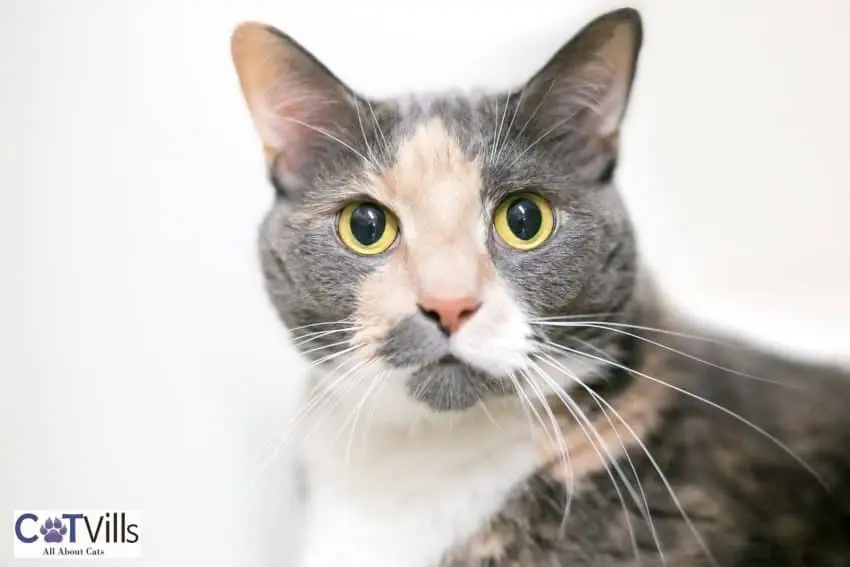
Scientifically speaking, when the pupils do not constrict back to regular size, this is called ‘mydriasis’.
Dilation of the pupils of the eye should occur in certain circumstances but should never be a permanent change.
In a healthy cat, we will see temporary pupil dilation due to:
#1 High stress levels
For example, a cat who is in extreme pain or who is very anxious about being in a vet clinic will have large, black eyes.
Once your kitty calms down and is feeling back to normal, its pupils will constrict.
#2 dim light
In dim light, it is normal for pupils to dilate in an attempt to let the maximum amount of light in.
However, as soon as the level of light increases, the pupils constrict.
You should have your vet check for this response by shining a small flashlight into the eyes.
#3 Iris Atrophy
Iris atrophy that occurs in elderly cats can lead to larger pupils. The colored part of the eye is also called the iris. This naturally thins out our senior kitties.
The weaker muscle is less capable of constricting pupils. While your senior cat is in no danger from its iris atrophy, it is important to confirm the diagnosis with a vet.
#4 Medication
Medication side effects are another consideration.
For example, if atropine drops have been applied, the pupil will dilate temporarily.
7 Reasons Why Cats Eyes Always Dilated
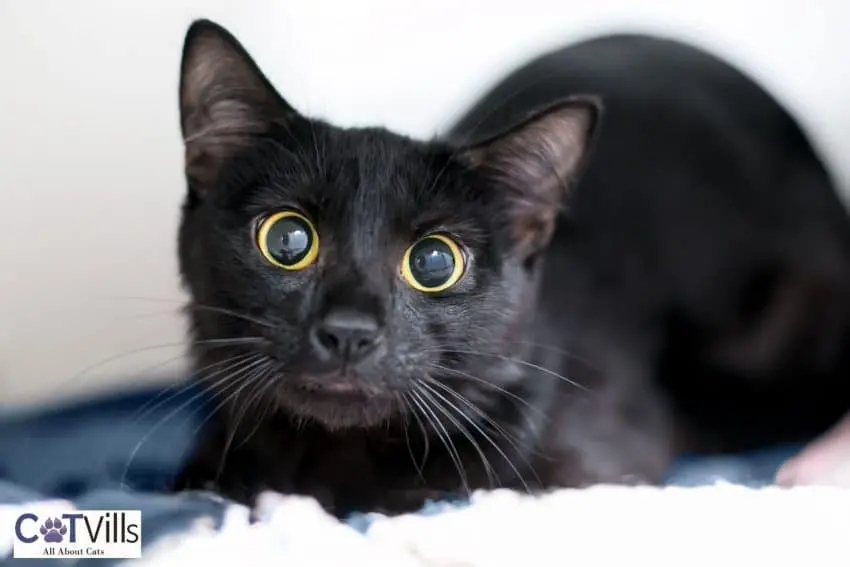
Why are my cat’s eyes always dilated? This is a question many cat owners ask me with concern in their voices.
Certainly, noticing something unusual is always cause for anxiety and needs to be looked into.
A cat with dilated pupils could have a range of medical conditions and common explanations include:
#1 High Blood Pressure
High blood pressure in cats can be hard to diagnose as signs are not always obvious.
We most commonly see high blood pressure in geriatric cats, particularly those with an underlying condition such as hyperthyroidism or kidney failure.
A cat’s blood pressure should be between 120-150 mm HG, but those with hypertension often have regains over 180mm HG.
High blood pressure is usually treated with oral medication and it is important to address any underlying medical conditions.
#2 Blindness
A cat with dilated pupils may actually be blind. Warning signs can include sudden disorientation, inability to find their litter box and food bowl, banging into objects, and not wanting to move about.
Sudden vision loss is a true emergency and warrants an immediate vet visit.
Certain ocular issues, such as a detached retina, can be treated successfully if your cat is seen promptly and does not have to result in permanent blindness.
#3 Key-Gaskell Syndrome
Also known as feline dysautonomia, affects the autonomic nervous system and can be diagnosed in cats of any age. Signs are wide-ranging and can include e.g. diarrhea, dry eyes, and dehydration.
Sadly, this condition has a poor prognosis and only a small number of cats make a full recovery once severely affected.
#4 Chronic Pain
Any ongoing physical pain that is causing your pet distress can be the reason for a cat’s eyes being always dilated.
It isn’t always easy for an owner to localize pain but a veterinary expert should be able to find the source.
The vet will check for more common causes of pain including joint disease and dental disease.
#5 Toxin ingestion
A variety of toxins will affect the nervous system causing dilated pupils including permethrin and certain anti-depressants.
Most cats will also experience additional signs of toxicity including vomiting, tremors, and irregular heart rhythms.
#6 Increased intra-ocular pressure
Increased intraocular pressure can cause intense pain. It is advised that this pressure is measured in ALL feline patients with dilated pupils.
Causes for glaucoma include uveitis, tumors, and lens dislocation.
#7 Physical trauma
i.e. eye trauma can lead to pupil dilation which may be permanent or temporary.
A fall from a height or road traffic accident can be to blame.
If my cat’s eyes are always dilated, what test will the vet run?
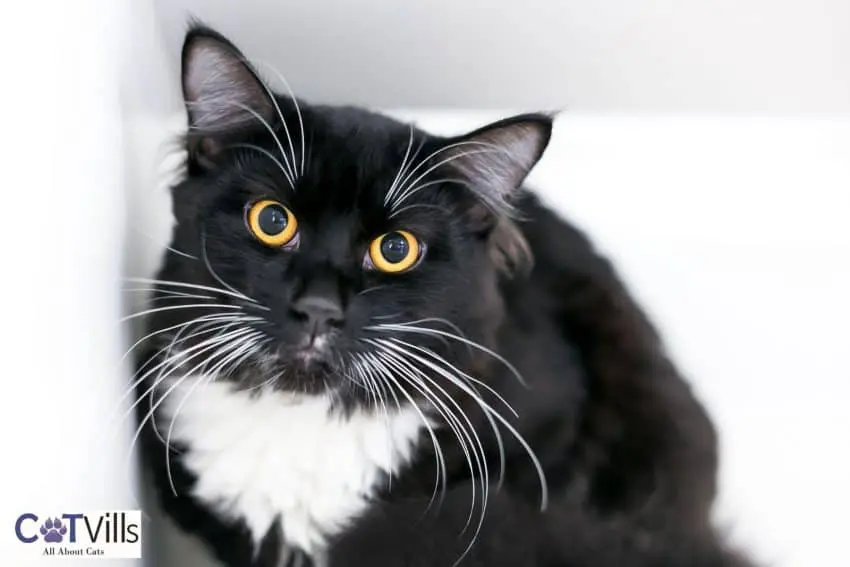
Diagnostic tests will be needed to determine why your cat is unable to constrict its pupils and has large, dark eyes.
Initially, your cat will take a full clinical history and will look back on any medical records available.
Next, they will perform a thorough physical exam. After, they will focus on your cat’s eyes.
Tests will include checking:
- Pupillary Light Reflex (shining light to assess the pupil’s ability to change size; pupil size should change quickly),
- Dazzle Reflex (assessing if your cat reacts to bright light)
- Menace Response (checking vision by performing a threatening hand gesture towards the eye, to see if your cat reacts).
They should use an ophthalmoscope to assess the optic nerve and retina.
Your vet may also perform a neurological exam, to assess your cat’s nervous system. It is likely the eyes will be stained with a Fluorescein dye to assess for any corneal scratches or ulcers.
Additional testing such as checking the intraocular pressure and swabbing any ocular discharge should also be performed.
What is the prognosis for my cat with dilated pupils?
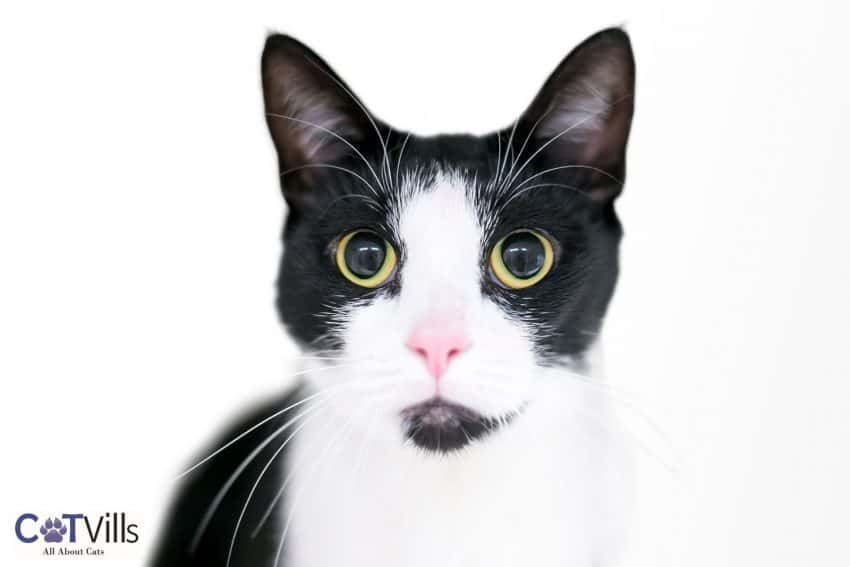
As there is a wide range of causes for a cat whose pupils will not constrict, the prognosis varies greatly.
For example, a cat whose pupils keep dilating due to stress is exhibiting a normal reflex and is not unwell.
A cat who has dilated pupils due to medication will make a full recovery once the medicine has been stopped.
Conversely, if your cat has a serious neurological disease such as Key-Gaskell Syndrome, their prognosis is poor.
What if only one of my cat’s pupils is dilated?
The medical term for this is ‘anisocoria’. When one pupil is larger than the other (which remains normal size), there is an underlying issue.
Of course, it is possible that one eye is more constricted than the other, but this is a lot less common.
Oftentimes, the cause is localized to the affected eye. There could be a foreign body under the eyelid, a corneal ulcer, severe eye infection, uveitis, or a tumor that is affecting the pupil’s ability to constrict.
Horner’s Syndrome is also a consideration. On top of the anisocoria, cats will have a protrusion of the third eyelid and a sunken eyeball.
This disease is most often idiopathic, meaning we do not find an underlying cause.
is it normal if my senior cat has dilated pupils?
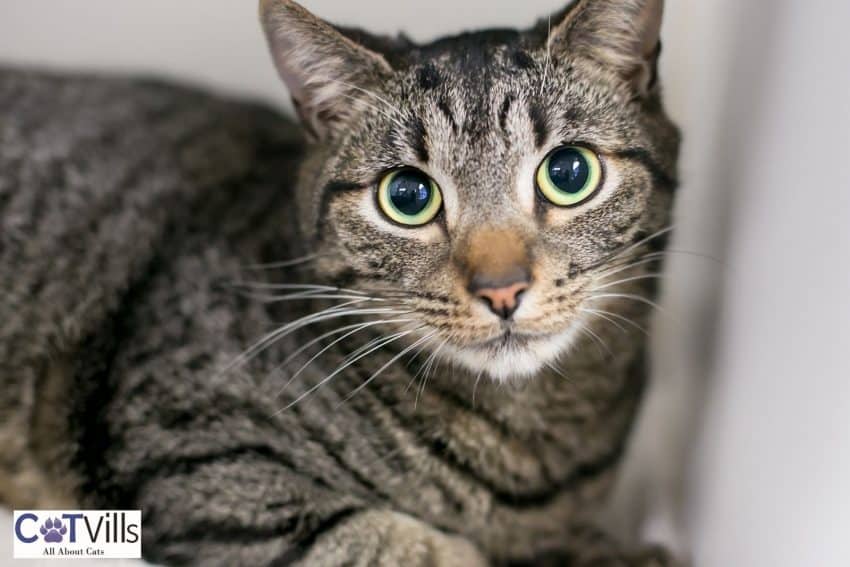
While it is true that many senior cats develop iris atrophy with age and will have dilated pupils, we shouldn’t brush off their dilated pupils and assume it is normal.
Older cats are prone to those underlying diseases that can dilate the pupils (many of which are age-related conditions), such as an overactive thyroid gland and an increase in blood pressure.
It is important that a senior cat has a full check-up to see if their pupils remain permanently dilated.
FAQs
What does it mean when a cat’s pupils are dilated?
Dilated pupils can be a normal response to an event (such as being in a darkened room) or might be indicative of a health issue.
If the pupils remain dilated for a prolonged period of time, even in bright light, there could well be a problem.
A vet visit is advised, to determine what is going on with your cat’s eyes and provide timely veterinary treatment.
Do cats eyes dilate when in pain?
Yes, it is common for a cat’s pupils to dilate when in pain. Similarly, when their cortisol (the stress hormone) is elevated, their pupils will be much larger than usual.
When should I be concerned about dilated pupils?
If your cat’s eyes are remaining dilated or are dilated in situations when they shouldn’t be, a vet visit is sensible. This is true regardless of your cat’s age or breed.
Conclusion
Healthy eyes will constrict and dilate, depending on external and internal factors. It is a good sign when your cat is able to do this.
However, if you notice your cat’s eyes are always dilated, it is time to book a vet exam.
As there are many potential causes for pupil dilation, it is likely your vet will run a series of tests to get to the bottom of things.
While some conditions can be easily treated, others have a poorer prognosis.
Have you seen your cat’s eyes always dilated? Please share with us below!
Resources:
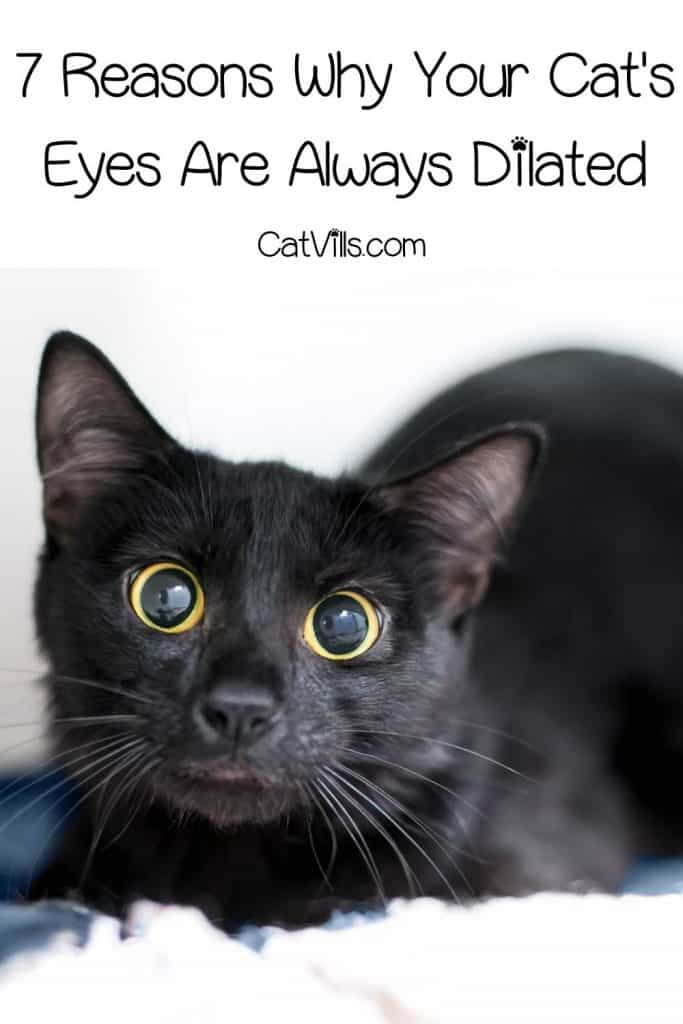

My senior cat has continuosly dilated eyes. It seemed to have happened overnight. He is eating and drinking and using his litterbox. He doesn’t seem to be in pain or excited. Just stares ahead. Can he live a happy life if blind. He’s an inside cat. Thankyou